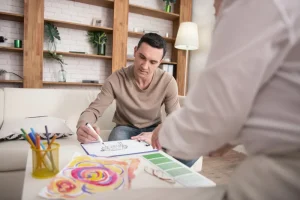Telefon:
+48 512 586 949

For some, sleep disturbance can be what’s causing a person’s depression, and for others, sleep disturbance can exacerbate a person’s already developed depression. Whether you’re experiencing issues with a family member, friend or stress in your romantic relationship, this can make symptoms of depression worse. For this reason, finding healthy ways to communicate is essential. “People who does drinking make your depression worse have an anxiety disorder and then drink are going to have even bigger effects,” says Koob. If you’re being treated, he suggests asking your doctor to make sure it’s OK for you to even drink at all—it may be contraindicated for some depression and anxiety medications. The overwhelming feeling of depression and anxiety after a night of drinking is more common than you think and here’s why.

Brief Motivationally Focused Interventions May Effectively Address Alcohol Use Among Depressed Patients
Negative thought patterns are a common component of depression and it can be helpful to learn how to shift this way of thinking. We are no longer supporting IE (Internet Explorer) as we strive to provide site experiences for browsers that support new web standards and security practices. Koob suggests Rethinking Drinking, and the NIAAA website that provides information on alcohol and how to spot a potential Drug rehabilitation problem and get help.
„I used alcohol to cope with feelings of panic, isolation, and sadness.”
- Another risk is that as side effects increase you may be tempted to stop taking the antidepressant, which can lead to a relapse of symptoms.
- These tests help them calculate your risk factors for either condition.
- Alcohol can affect the areas of your brain that help regulate emotions.
- Even during the high, Boden points out, booze slows our mental processes, metabolism, breathing, and other functions.
- Excessive alcohol intake can have detrimental effects on your health, especially for people with depression or anxiety.
Increasing evidence indicates that heavy alcohol use may interfere with depression treatment. Rae, Joyce, Luty, and Mulder (2002) found that among depressed patients with a history of alcohol dependence, those who were current heavy drinkers experienced worse depression treatment outcomes. While it’s common to experience a hangover or feel a bit sluggish after drinking alcohol, for some people, alcohol consumption can exacerbate depressive symptoms. Alcohol affects the brain’s chemistry, and its depressant effects can intensify feelings of sadness and hopelessness, particularly in those already dealing with depression.

Alcohol Use Among Depressed Patients: The Need for Assessment and Intervention
Much like barbiturates (sedatives), alcohol is a drug that affects the central nervous system (CNS) and the brain’s functionality. If you have depression and anxiety and want to drink alcohol, there are some considerations. Generally, you should limit your intake to 14 units of alcohol in a week — this is equal to six standard glasses of wine or six pints of lager. Be sure to spread those drinks out evenly over the week and have drink-free days in between. Everyone feels blue or down from time to time, and people often say that they feel “depressed” during these temporary bouts of sadness. But clinical depression isn’t just a matter of feeling the occasional ups and downs or periodic sadness caused by issues of daily life.

If you wake up feeling miserable after a night of drinking, you don’t have to wait it out. Here are a few strategies to help you lift your spirits in the moment. It’s more likely to worsen negative mood states, along with physical health. While alcohol use can directly trigger feelings of depression, it can also contribute to symptoms in more indirect ways.

- Alcohol is frequently used to numb uncomfortable emotions and can become a habitual pattern that disrupts the natural balance of neurotransmitters in the brain.
- But when the effects of the alcohol wear off, you can feel worse than you did before.
- This can mean going for walks, practicing yoga, or heading to the gym.
- The aforementioned depressive disorders each have slightly different diagnostics criteria.
- If you drink a lot you are more likely to struggle with depressed feelings.
- That doesn’t necessarily mean “a wicked hangover,” Boden stresses.
Relief was a central feeling when I received my depression diagnosis. I could stop pushing myself through the day with the message „Don’t be such https://ecosoberhouse.com/ a baby.” „Most people — and I used to think this too — believe that depression is a reaction to difficult life circumstances,” says Hegerl. More than one in ten people in Germany were diagnosed with depression in 2022. In total, that’s around 9.5 million people, and the trend is rising.
- No matter your drink of choice, alcohol can easily be abused and often is, especially when it’s used to self-medicate.
- You don’t have to battle the depression alone and relying on alcohol to make you feel better will only cause further pain.
- It accounts for around 80% of cases of lung cancer, which is the most common cause of cancer death in the United States.
- According to the study, however, the size of the salience network correlates with certain symptoms of depression, such as the loss of joy and motivation.
- Understanding the link between alcohol and depression can help you better manage depression after drinking, or better yet, prevent it from happening in the first place.
